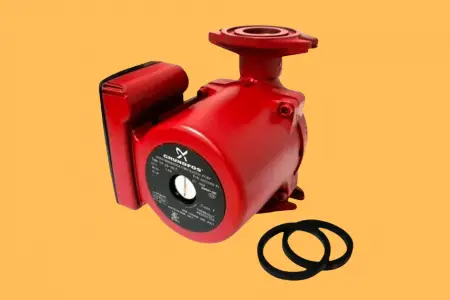Hot water recirculating pumps are special plumbing devices that provide all areas of your home with an instantaneous supply of hot water. Recirculating pumps aren’t required in homes, but they’re an excellent commodity for homes where you have to leave the water running for a while before hot water shows up.
If you don’t want to leave your hot water recirculating pump running non-stop, you can turn it off. Recirculating pumps can be turned on and off according to when you want to use them.
However, just because you’re able to turn off your recirculating pump doesn’t mean that you should. Turning off the recirculating pump means that you will have to wait for hot water to arrive rather than having it on demand. In this article, we’ll look at how to turn your pump off, whether or not you should, and what happens when you do.
Hot Water Recirculation System Problems
While hot water recirculation systems are extremely handy, they aren’t immune to problems. Let’s go over some of the most common problems and solutions that you’ll likely encounter with a water recirculation system.
They Waste Power
If you leave your recirculating water pump running around the clock, you should expect to use a ton of power. Your pump doesn’t know when you’re using or not using hot water. As a result, it could be the middle of the night or while you’re on vacation, your water recirculating pump will kick on anytime water inside the pump gets cold. While hot water recirculating pumps are fairly efficient, they still take power to operate.
Solution
There are two basic ways to save power on your recirculation pump. The first way is to insulate your pipes and pump to keep the water inside of them as warm as possible. The second way is to turn the pump off at night or when you leave your home for long periods of time. Insulation will mean that the pump doesn’t have to run as often, and turning the pump off will ensure that it doesn’t turn on when you don’t need it.
Corrosion to the Pump and Components
Anytime that you mix water with metal, you’re going to have some level of corrosion. Recirculating pumps and the plumbing pipes that are connected to them are no different. As water flows through the pump and pipes, corrosion is inevitable and will cause the breakdown of your plumbing systems.
Solution
To reduce the risk and damage of corrosion, you can either install a lower capacity pump or minimize the chances of water changing flow direction. You may have to rework your plumbing system to ensure that your water doesn’t change direction.
They’re Very Noisy
Another huge problem that people run into with recirculation pumps is that they tend to be noisy. However, noise is only excessive when there’s a problem with your pump. Loud noises could mean that there’s air in the system, your pump is too big or too small, the bearings are worn out, or the system is clogged.
Solution
Each of the problems above has a different solution. If there’s air in the system or the system is clogged, you’ll need to drain the system and remove all the water and air inside of it. If the problem is worn out bearings, you must replace the bearings before continuing. Finally, for an oversized or undersized pump, you’ll have to replace the pump with one that’s the appropriate size for your plumbing system.
Low Flow Rate
A recurring them with recirculating pumps is that they don’t produce enough water pressure, which results in a low flow rate. This is almost always because the motor in the pump is too small. In some cases, the pump is too weak to even turn on your water heater when hot water needs to be created.
Solution
Unfortunately, if you have low flow rates because of a pump that’s too small, there isn’t a whole lot you can do outside of purchasing a larger pump. The best way to avoid this problem is by consulting a professional plumber and having them install a pump that’s the appropriate size.
How to Turn Off Hot Water Recirculating Pump
Turning off your hot water recirculating pump is surprisingly easy. There are multiple ways to do it depending on how the pump was installed. In some cases, it’s as easy as unplugging the power cord or turning off the breaker that controls the pump.
Another option is to install a timer on your water pump that automatically turns it off when it’s not in use. Also, you can install wifi sockets on your recirculating pump that makes it smarter, easier to operate, and easy to turn off.
How Long Should a Recirculating Pump Run?
From the time that your recirculating pump kicks on, you can expect it to run for two to four minutes per hour. This time frame can increase or decrease depending on the size of your pump in comparison to your plumbing system, as well as how often you use hot water.
How to Make Water Pump Without Electricity
Pumping water without electricity is a complicated and timely process, but it is possible. You’ll have to use physics, ingenuity, and a variety of plumbing components to accomplish this feat. Here’s a video explaining how to pump water without electricity and how the process works. Next time the power goes out and you need water, you can impress your household with this handy science trick!
How to Make Water Circulate Without a Pump
One of the most common methods that plumbers use to circulate water without a pump is to install a recirculation water line. Basically, a plumbing pipe gets installed that connects the water heater to the farthest point in your plumbing system. Recirculation lines aren’t quite as fast as pumps are, but they’re much cheaper to install and are extremely low maintenance. Contact a plumbing professional if this is something that you’re interested in.
FAQs
How much does a recirculation pump cost?
On average, you should expect to pay between $200 and $400 for your recirculating pump. Having it professionally installed will likely double or triple the cost, but it’s worth it to ensure proper operation.
How long does a recirculation pump last?
If your pump is properly installed and maintained, it should last at least 10 to 15 years.
Conclusion
As you can see, it’s perfectly ok to turn off your hot water recirculating pump when you’re not using it. In fact, it’s an excellent idea to do so in order to prolong the lifetime of you pump and to save money. The main thing to keep in mind is that you turn your pump off safely and remember to turn it back on in plenty of time to get hot water to where it needs to go.

Nick Lopresti is the founder of YourH2Home and a home improvement expert. He has years of experience writing about various home improvement topics, mostly as it pertains to water systems.
